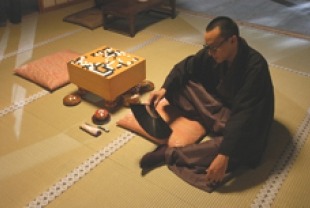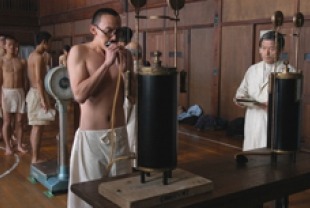It takes a certain kind of filmmaker to try and depict the dramatic nature of chess. One has to be patient and open to the nuances of human interaction and the subtle delights and intensity of play. Marleen Gorris did it with The Luzhin Defence about the 1929 world chess championships at an Italian lake resort, and Richard Dembo did it in Dangerous Moves, a behind-the-scenes look at this cerebral sport during the World Chess Championship in 1983 in Geneva, Switzerland. The best American film on the subject is Steve Zaillian's Searching for Bobby Fischer.
Tian Zhuangzhuang has taken on the challenge in this quiet and reflective Chinese film about the life of the twentieth century's greatest player of Go, the Eastern equivalent of chess. Wu Qingyuan was born in 1914 in China and was identified as a Go prodigy at the age seven. After his father's death, Wu and his mother emigrated to Japan and at fourteen, he established himself as a formidable Go player in a challenge tournament against a reigning Japanese master.
The quest that drives this dedicated and sober young man (Chang Chen) is his love of the game and his search for spiritual inner peace. After being introduced to the Akamanji sect, he meditates and finds fellowship in this community. Wu battles tuberculosis, and his Japanese mentor Segoe Kensaku (Emoto Akira) and his wife (Matsuzaka Keiko) pay for his medical treatment. TB actually becomes beneficial for him as it gains him an exemption from military service. His mentor is such a hard taskmaster that he organizes a tournament in Hiroshima and is waiting for Wu to arrive when the American atomic bomb is dropped on the city.
The Go master marries and both he and his wife (Itou Ayumi) discover that their latest Buddhist sect has been taken over by Jikou Son (Minami Kaho) who proclaims herself an incarnation of the Divine. Wu is so disturbed by this development that he considers suicide but instead leaves the sect with his wife in 1948. In 1961, he is badly injured by a passing motorcycle. The concussion he suffers inhibits the concentration required for Go.
The Go Master contains snippets from Wu's diary, a device that adds to the drama's internal exploration of his journey. One comes away from this sober film with a respect for ways in which something as simple as a game with stones and a board can shape a life and give it meaning and purpose.
Screened at the 44th New York Film Festival, Sept. 2006

